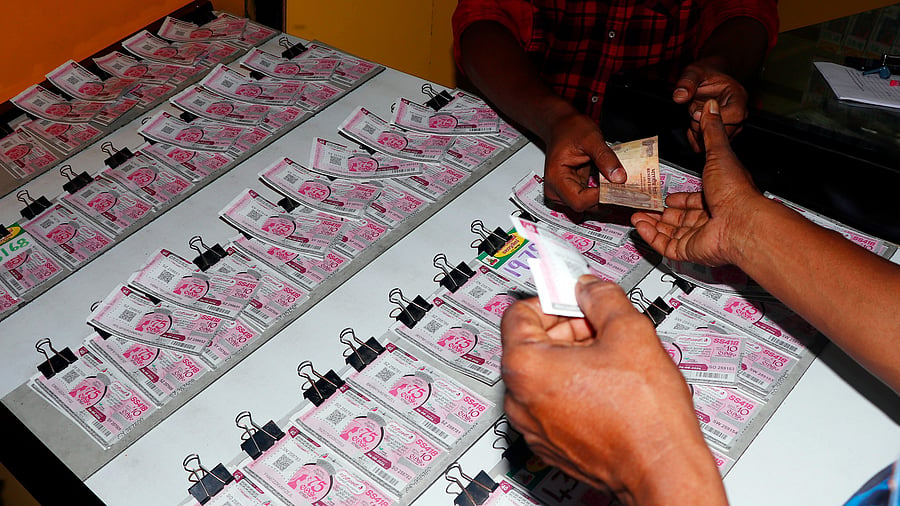
Image showing a person buying a lottery ticket. For representational purposes.
Credit: iStock Photo
New Delhi: The Supreme Court on Tuesday held that the Centre cannot impose service tax on the distributors engaged in promoting, marketing and organising lottery, as only the state governments have the power to do so.
A bench of Justices B V Nagarathna and N Kotiswar Singh dismissed a batch of appeals by the Union government and upheld a series of judgments passed by the Sikkim High Court between 2012 and 2017.
"The detailed analysis of the relevant provisions of the Finance Act, 1994, and amendments made thereto in light of the clauses of the agreements...as well as the judgments of this court, would not persuade us to take a different view from what the Sikkim High Court has taken," the bench said.
The High court had held that Parliament had the power to levy taxes on any subject matter, including service tax, under the Union List, however it does not have the same competence and jurisdiction under State and Concurrent List.
Finding no merit in appeals, the bench said, “Although a lottery ticket is nothing but an actionable claim, the conduct of a lottery scheme is nothing but a betting and gambling activity. Therefore, it is only Entry 62 – List II which enables the imposition of tax by the state government.”
The court also said that activities of promotions, organising, reselling or any other manner assisting in arranging of lottery tickets of the state lotteries do not establish the relationship of a principal or an agent but rather that of a buyer and a seller.
It pointed out at each stage, the amendments made to the Finance Act, 1994, in order to impose service tax on the sole distributor or purchaser of the lottery tickets, respondents-assessees herein, have been unsuccessful.
"We have reasoned that the amendment to the said definition would in no way detract from the substance of the relationship between the state government and the sole distributor or purchaser of the lottery tickets which is one of principal to principal and not of principal-agent," Justice Nagarathna wrote in 120-page judgment on behalf of the bench.
The court held, there being no agency and no service rendered by the respondents-assessees herein as an agent to the government of Sikkim, service tax is not leviable on the transactions between the purchaser of the lottery tickets, respondents-assessees herein, and the government of Sikkim.
The court pointed out that the HC had applied the test of the principle of pith and substance and observed that the power to levy tax on lotteries, which are considered games of chance and fall under "betting and gambling" in Entry 62 - List II of the Seventh Schedule of the Constitution, lies exclusively with the State Legislature.
Consequently, Parliament's authority to impose such a tax under its residuary power in Entry 97 - List I, read with Article 248 of the Constitution, is excluded. The High Court held that while Parliament is competent to levy service tax under Entry 97 – List I, this does not imply that it can impose such a tax on lotteries, as the power to levy taxes on this subject has been conferred on the State Legislature in List II.
That the residuary powers of Parliament can only be exercised when no Entry in any of the Lists provide a legislative field. Hence, it is the exclusive legislative domain of the State Legislature to levy tax of any nature on lotteries by virtue of Entry 62 - List II, the top court affirmed the HC view.
The Union government filed the appeals against the HC judgment that declared clause (zzzzn) of the Section 65(105) of the Finance Act, 1994 as inserted by the Finance Act, 2010 as unconstitutional. The amendment had introduced the activity of “promotion, marketing, organising or in any other manner assisting in organising game of chance, including lottery” as a taxable service.
